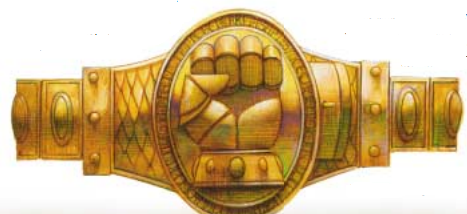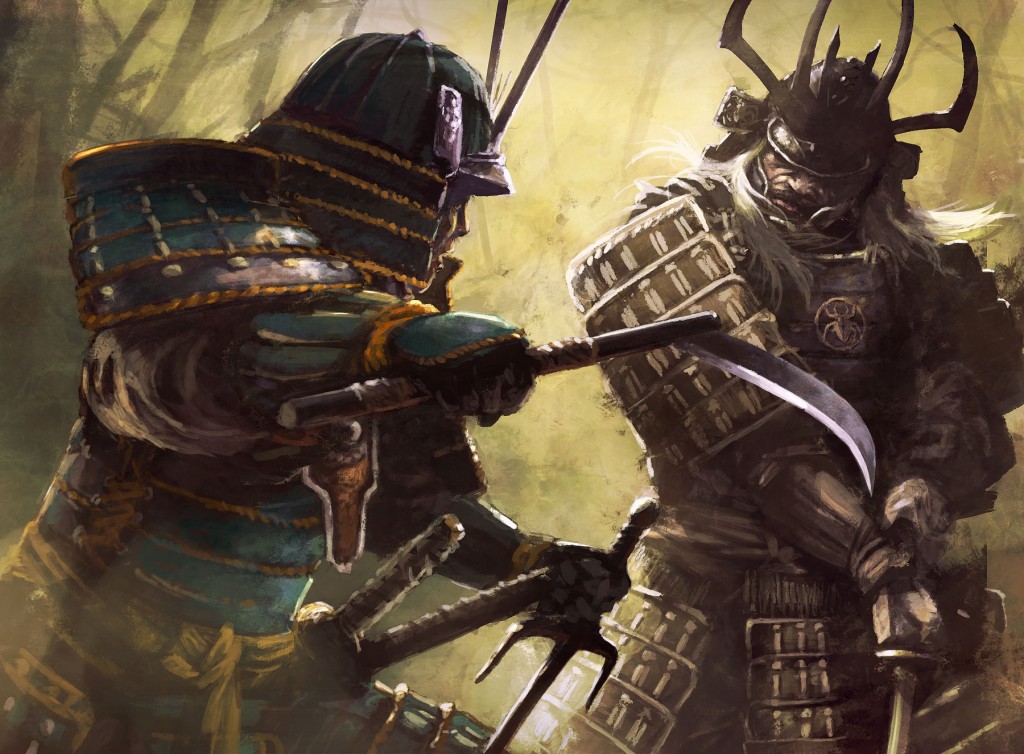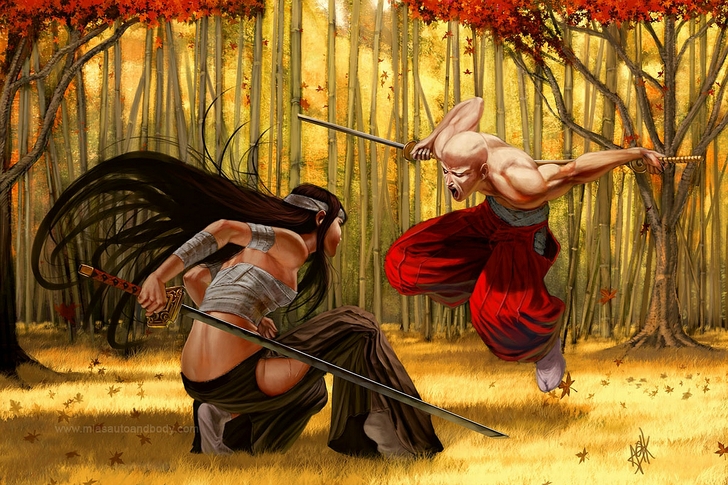Yunshan’s customs can seem like madness to outsiders, but there is logic to the bizarre practices that makes sense in the context of this mystic realm. Here are 8 sets of practices and customs, many of them described by the philosophers who were famous for establishing them…This does not sum up the myriad beliefs of Yunshan, but captures the flavor of the most famous traditions. People of the six High Clans and those who live in the Temple Lands tend to follow these traditions very devoutly. Among the Nozufoo, it depends. Nozu who live among the Clan Lands do follow them very closely, while those that live in more worldly places at the edge of Yunshan like Barter Town or Fanlu tend to be less strict, or only follow a few of these. Nozu who live in the wilderness will often have their own set of bizarre customs, usually mimicking a few of these along with a few other unique to their area.

In some versions of the legend Shang Ti does not sacrifice his body, but falls into a deep meditation, contemplating a way to save the world from darkness. As he sleeps, with one claw he holds back chaos, and in the other he cradles the divine fire of hope.
1. Precious Metals
When the great dragon Shang Ti laid down his life, that order might be restored to the world, he left behind the fragments of his being all around us, like gifts that might be used to supplicate the spirits and protect the clans. His bones became the Iron that the mountains stand on, his blood soaked into the earth and became copper. His teeth where made of silver, and his scales of gold, and most precious of all, his spirit became shards of jade…
These gifts we pull from the riverbeds and mountains must be used properly.
Iron is fit to make tools and weapons. Common men may wear and work with it.
All the other metals are the subject of great power, and must be used strictly by custom to show respect and avoid disaster. Copper is safe for all men to handle or wear, but can only be worked by priests. Silver and gold can be worked only by priests. These metals are only suitable in the making of religious items and the adornment of temples. Only priests may wear them, and it is bad luck for a non priest to touch them with his bare hands.
Now the barbarians beyond the mountains, and the kings and nobles of the Tien Ming and the Shinto Dynasties wore these things for adornment, and such action is more the reason why disaster befell them! This only makes sense. These people also used the sacred metals as money in lieu of goods as an aid to make trade. They deal in coins! This custom is the biggest example of the ignorance that rules the barbarian’s world. What worse luck could one create than to employ the most sacred metals in the lowliest of tasks! I not only say to you, but I warn you, let barbarians and Nozufoo deal in this foolishness and reap its consequence! As for you, make trade in real goods!
Now there is a new custom among many clansmen, by which favors made of copper and given out by the great temples are passed between men to pay a debt or buy a thing. I have thought long on this matter and so long as the spirits do not complain, it seems to be an acceptable practice. The favors are made of copper, which all men may touch without bad luck, and they are blessed, so they will carry no bad luck. To use favors in trade is allowable, but to use these things called coins, is to invite spirits of greed and bad luck into your life. Turn away from the man who offers you gold and silver coins in trade!
-Duyi Jinjing
Extraordinary one whose Essence was of Gold
No Bling?
The People of the Mist do not wear jewelry crafted from precious metals. Only the priests of the regions various monasteries and temples are allowed to do so, and such jewelry always takes the form of religious items such as talismans, amulets, or headbands. To wear one of the holy metals as adornment is a feat of ultimate vanity. The common clansmen and women do wear jewelry crafted from leather cord, silk, and various beads and gemstones.
No Coinage!
The People of the Mists do not use or except coins in their daily barter. Instead they use a strange system in which tiny religious items, usually crafted from copper, are used as a form of currency. These items usually take form of circular rings, beads, tiny bells, or even figurines depicting various icons of the spirit world. These small trinkets are minted by the great temples. This is not to say every monk is a metal smith or money changer. The task is usually allotted to a special sect within each temple. Each piece is marked with the symbol of the temple where it was minted, and the name of the priest who made it.
This practice started long ago when the various temples would reward lesser relics to common men who performed some service for them. These relics where like IOUs, that could be redeemed by the holder for services only holy men can provide. Over time the temples produced more and more of these items, using them to buy influence among the various tribes. Now, centuries later, Yunshan’s currency consists of small holy symbols and religious trinkets made of copper. Their value is backed by the divine power the temples wield, and the less wondrous but equally important social value of the rituals only agents of a temple may perform, such a officiating a marriage or saying a blessing over a newly constructed home. The power to wed, to bless crops, to properly deal with the dead…the very real power to fight against evil spirits and heal the sick, and to supplicate the gods on behalf of man…these powers and services are central to the survival and culture of all who live in Yunshan, and have become the very backing of it’s currency!
The Priests are the Money Changers!
When a foreigner comes to Yunshan to trade, he must first convert his coins to the local religious based currency. The great temples are more than happy to take the gold and silver, which is very important in the construction of their temples and spiritual practices. The merchants are happy to take the copper trinkets which they need to trade with the local Nozufoo merchant clans to acquire the precious spices and rare things Yunshan is known for.
2. Three parts to each day, and a Different Face for each.
When the sun rises you too should rise, for as he toils to work he will look down upon those who do not rise to work with him and say, “you are lazy, and though needs must I share the light of my body with you, I shall not shine the light of my spirit upon you! Lazy!” During the day the spirits of labors and tasks walk the earth and search to reward those  who toil in rightness, and to bring bad luck upon those who do not! To toil in Rightness is to be serious in your work. You should not waste word upon small talk when you work, and it is better that your only talk pertain to your work. You should not laugh, for a watchful spirit may happen by and take your laughter as a sign that you are not working. To work in rightness is to mind your faults, and to mind the faults of others as well. If you see a man who toils not in rightness you should take notice. If he is younger than you, you should strike him lightly and say, “Stop that!” If he is your age you should shout at him. If he is your senior you should remain silent, but prey for him.
who toil in rightness, and to bring bad luck upon those who do not! To toil in Rightness is to be serious in your work. You should not waste word upon small talk when you work, and it is better that your only talk pertain to your work. You should not laugh, for a watchful spirit may happen by and take your laughter as a sign that you are not working. To work in rightness is to mind your faults, and to mind the faults of others as well. If you see a man who toils not in rightness you should take notice. If he is younger than you, you should strike him lightly and say, “Stop that!” If he is your age you should shout at him. If he is your senior you should remain silent, but prey for him.
When the sun is two thirds across the sky it is time to throw off your labors. This is a mystical time when day is passing to night, and it is now the spirits of mirth come out to walk the land. Now is the time you must put away your work tools quickly. All without young children must make way to the sake house of their village and drink, for if the spirits of mirth find a man who is too sober they will bring him bad luck. As a person makes merry during his life, the spirits of mirth grow warm to him and do not require as much of him, thus is the custom: If you are an adult, but still young, you must drink 5 cups of sake before you leave the sake house to go home. If you are an adult, 4 cups will satisfy the spirits. If you are an elder, the spirits of mirth already like you, and you need only drink 3 cups before you retire.
Those with children too young to go to the sake house with them, should go to their homes instead, but must still take part in the drinking! The spirits of mirth love children most, and will surely be near to make sure those watching the children do not deny the joy that belongs to each evening tide! Also, those with children should try and visit the sake house on the last eve of each week, so they can stay close to their clan, and appraised of new happenings.
It is bad luck to talk too much of work during this time, and even worse luck to plan for the next days work. It is very bad luck to fight during this time. Men who fight offend the spirits of mirth, and also the spirits of martial arts, who take drunken sloppy fighting as an insult to their art. During this time songs and joke telling are best. The spirits also smile upon those who share wisdom, and tell humorous versions of their clan’s legends. Be careful not to make mockery of an important legend however, for such behavior is bad form, and may anger the spirit of an ancestor if he is standing near by.
When the sun is down, and only when the sake is finished, it is the time for quiet talk, rest, reflection, and sleep. This is no time for work! The night is a time of mischievous and untrustworthy spirits, so men should not travel or make very much noise during this time. It is good at this time to turn your thoughts towards those you love and how you might bring joy or help to them in some way.
– Mingxia Zhongying
Bright Heroine, Ancestor Esteemed
Three Faced Men.
People of the Mist clans tend to be very different at different times. During the day they seem rude, short tempered, and not very talkative. As the afternoon sets in they become outspoken, warm, drunken, and even a little outrageous. Then as night comes they become passive, thoughtful, and soft spoken. This is bewildering to foreigners who pass through Clan Lands. Those who don’t understand the practice can mistake the People of the Mists for mad men! Many of the Nozufoo settlements, including Bartertown, do not adhere to this tradition, or follow a much less extreme version of it. The High Clans however, view this practice a central to a good life, and pursue it with rigor and dedication!
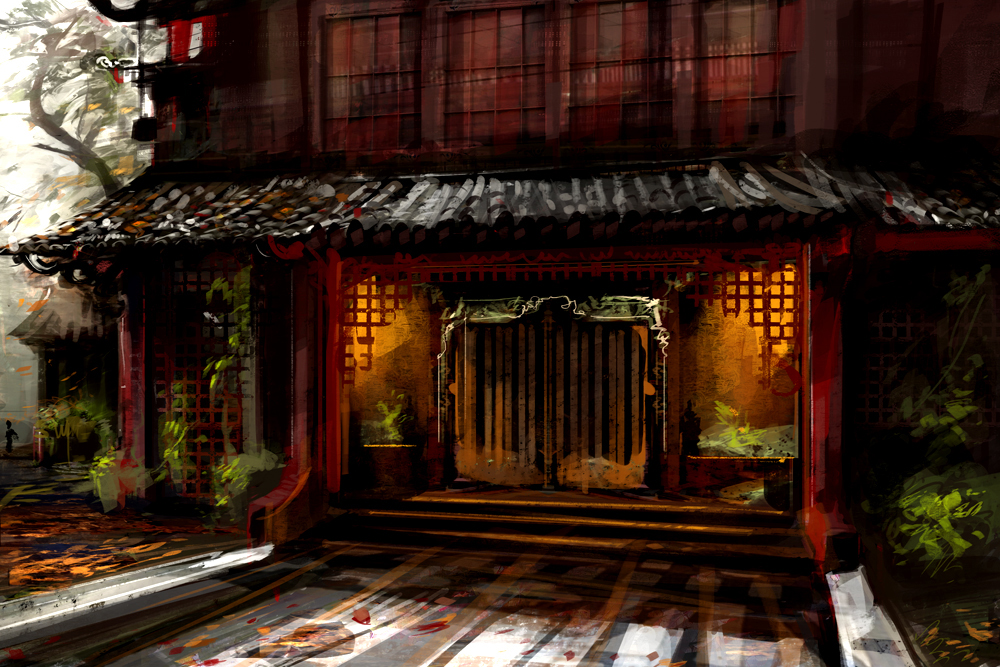 Sake Houses.
Sake Houses.
Every village has its sake house, a place where the villagers gather at the end of the work day to drink and make merry. Large villages have several, and the towns of the larger clans will have dozens. In these larger towns the sake houses are often themed to cater to a certain class or guild. For instance, there may be a general sake house, but also one for travelers, and one just for the young of the clan, and yet another for the clan elders. There is often a special sake house just for the leaders of the clan. Also common are sake houses just for the clan’s warriors, sake houses for carpenters or fishermen, and ones for those who are unmarried. Though these establishments are themed, it’s up to the owner of each sake house how strict they are on who they let in, and many believe the spirits of mirth bring bad luck to one who denies a patron a cup of sake in the afternoon.
Each Saki house is run by a distinct family within the clan who is also in charge of brewing sake and other drinks for the clan. Some sake houses will import and sell liquors from other clans or distant lands. Others only serve their house brews and would be insulted if a patron asked for anything else. It is considered a faux pas to ask for a liquor which is not clearly displayed behind the bar.
Saki is just one of many acceptable drinks. Plum wine, honey mead, and beers are also acceptable libations. Wine from grapes, and strong liquors imported from other lands are all the rage as well recently, but are much more expensive. Whatever the case, these places are quiet and usually deserted at day and night, but packed from afternoon to an hour after sundown.
No Work After Work
The Clans people will not work at night. Even if their town were under siege, and they were repairing a wall, they would stop at sundown! In their minds, it would be better to be without a finished wall than to potentially anger the spirits on the eve of battle. Having the spirits on your side is the most important thing in battle anyways! In times of need, making or discussing battle plans is allowed, but a priest should be on hand to make a lengthy plea to the spirits to forgive such burning of the midnight oil.
It is necessary to have sober men to be on guard for a settlement after work and during the night. This too is allowable, but those who take watch during these times must go to the nearest ancestor shrine or priest before and after their shift, or surely some bad luck will follow them home. Finally, the people of the clans will of course fight to defend themselves if attacked at night. In fact, they may fight with more confidence, believing that surely the spirits will bring misfortune upon the attacker for starting the battle at such an improper time. Duels are almost never fought at night, or during the time of mirth. To initiate a duel during this time is to gravely insult the target of the challenge.
Again, Nozufoo settlements are much less strict on these traditions, some ignoring them altogether. According to the People of the Mists, this continued denial of proper traditions is why the Nozu villages continue to be poor and plagued by troubles
3. Spirits of the Water
The goddess Li Na is queen of all the waters unto the ends of the earth. She has given to mankind the water of life that we may drink, and fish and travel upon it. But there are many spirits who govern the different streams and ponds and lakes in her name. Most of these spirits are hateful of man for the waves he makes upon there home. The spirits of the water are fickle and given to chaos, yet the goddess holds them at bay in their dealings with man, making them mild. But at night the goddess sleeps, and the spirits of lake and stream take this time to run wild and dance across their waters. Any man who finds himself upon the water, or too close to the shore may find the spirits mischievous or even violent, and while the goddess sleeps they will seek to strike at men, of whom they are jealous!
– Mingxia Zhongying
Bright Heroine, Ancestor Esteemed
No Travel on the Water Ways at Night.
Mist People will not take boats out on the water at night. Each day as the sun begins to set, fishermen and merchants race towards the nearest port to put in. Boatmen and captains take this seriously. Every trip on the water will have carefully planned stopping points that can be easily reached before sundown. Trips that require leaving land behind and spending a night at sea are undertaken under only the most dire of circumstances, and most captains will refuse such a trip unless a high priest will accompany the journey. It’s extremely rare that a boat captain ever gets caught on the waters at night. If such a thing happens, there are options.
Parties on small boats will race to the nearest land and pull their boats up on the shores and make camp a good ways away from the shore. Larger boats will drop anchor and light special candles all around the boat, believing that the spirits of fire will ward away the vengeful water spirits. The crew of such a ship will hide under their beds all night, careful not to make a sound that might attract the attention of a hostile spirit. A lot will be cast to choose one crewman to maintain a vigil. His fearful task will be to stay up all night above decks to make sure the candles stay lit. This is a dreaded task which crewmen will do almost anything to avoid. There are many tales of men stuck with this task vanishing during the night.
No Beach Front Camping.
Natives of Yunshan will never camp closer than shouting distance to the water. They test this fact before setting up camp near a lake or river, leaving one man at the shore and having the rest move inland. All the while the two groups shout back and fourth, when the moving group can no longer hear those on the shore they have reached a place where it is safe to camp without attracting a water spirit. This is yet more behavior that can seem crazy to an outsider. Every village has a dozen tales of people foolish enough to ignore this tradition disappearing in the night. In some areas, like swamps and places rich in lakes and streams, it’s almost impossible to find a spot beyond shouting distance to water. Such areas are generally deemed unfit to spend a night in, but sometimes small islands of “safe” land are known to locals or marked on maps as the only safe places to spend a night in such places.
The Docks.
Communities located on the water, and the docks associated with them are considered safe as long as special charms are hung up along the side of the settlement that faces the water, and along the length of each dock. These charms are long wind chimes or bells hung with strips of cloth. In addition, priest often make nightly offerings to appease the spirits in the waters near such settlements. Most clan’s people will avoid docks at night in all but the direst circumstances. Nozufoo and foreigners ignore this superstition as long as the proper chimes are in place.
Like a Bridge Over Troubled Waters
High Clan’s people and Nozu alike will not travel over a bridge at night if it has running water beneath it. People have been known to die rather than do so!
Nozu, and the more tradition bound Clans honor all of these traditions concerning water. There is something very real and terrible that tends to happen to those who don’t!
4. The Bones of the Dead
The People of Yunshan do not see the bodies of their dead in quite the same way as westerners. The flesh, muscle, and blood are temporary. These rot away when the soul has left the body, but because the bones remain, they are thought to be special. The spirits of the dead are thought to be fond of their bones because they contain all the lessons and memories they made during their life.
The People of Yunshan deal with their dead in a peculiar way. When the flesh has rotted from the bones, they are meticulously cleaned, polished, and given a light coat of lacquer to preserve them. Those who can will pay a specialized priest to scribe the important facts and accomplishments of the deceased upon the bones in a ceremonial way using precious inks that won’t fade with time. Family relations might be listed on the right femur, while friends may be listed on the left. Certain bones will list a person’s great accomplishments, while others might have entire poems which the deceased chose beforehand to express their lives philosophy to future generations.
The bones are wrapped in fine silk or linen, and entered into a family’s ancestor shrine. It is common practice for people to go to their ancestor shines daily and prey to those who have gone before them. An uncle who was known to be a great negotiator might be prayed to before an important business meeting. A grandmother who was very wise might be prayed to for guidance in a matter of the heart. If a family has a child who is going into battle, they might make offerings to an ancestor who was known as a great warrior, preying for protection on the battlefield.
In Yunshan the bones of the dead are not viewed with taboo as they are in the west. They are treated reverently as tools that allow the living to make contact with the dead and understand the importance of the past. The bones of the most famed family members are taken out and displayed on important holidays. This is called “bringing out the family bones”, which has also become a figure of speech which means to be honest or speak of a difficult matter. Sometimes the bones of an ancestor are unwrapped and handled in a ritualized manner when asking preying on a matter of great importance.
Going to the family shrine is sometimes referred to as “consulting the family bones”.
Of all the bones, the Skull is the most important. Skulls are macabre or symbolic of evil to the Pole of the Mist. Skulls are seen as a symbol of the dead at rest, and watching over the living. It is said the spirits of the dead can enter their old skulls and look through the eyes to check on the world any time they wish. The skulls of the dead are not viewed with a sense of the dread. They are symbols of protection from loving ancestors and physical reminders that good spirits are watching over the living.
When they can afford it, the people of Yunshan will have the skulls of important ancestors specially treated in a temple and dipped in precious metal, usually copper, but occasionally silver or even gold. The skull is them openly displayed in the household as an item of magical protection against bad spirits. Nearly every family has at least one skull over their hearth. Families of great wealth will have many. When a family has few they are kept in the most important parts of the house. When a family has many, they are hung up around the eves of the household, forming a continuous line of watchers to keep evil spirits away!
5. The Care and Feeding of Fire
Only 8 kinds of wood, oils blessed by priests, and the blessed coals and incense used in prayer, should be used to make fire. The Spirits of fire take offense if forced to feed on any other substance. If you see a man set to burn something else chastise him! If he has already started such an improper fire it is best you run away!
No fire should burn unseen. Lamps, cooking fires, and candles should not be lit in a place where people will not be. It is bad luck to leave a room with a flame in it alone. The lonely flame is a gate through which spirits of the underworld may peer!
Common fires must be lit in odd numbers, and sacred fires in even numbers. No room should have an even number of flames in it unless it is a holy place. No camp should have an even number of camp fires. If a place is found to have an even number of flames burning there, it may be a holy place, and you should act under that assumption.
It is bad luck to burn a fire beneath the sun. It is an insult to the spirit of the sun to do so. If you must burn a cooking fire or a signal fire during the day, it is best to do so when the shadows are long, and even better to find a way to burn such fires inside or beneath a cover.
It is bad luck to use fire in battle and warfare, unless it is used by a priest, who will know when it is right to use fire to this end. A fire used in war may burn something improper and anger the spirits of fire. A fire used in war may burn through the day and anger the spirit of the sun! Fire is easy enough to start, but difficult to stop, and may burn far more than you intended! Fire is a reckless weapon that often destroys the living of the common man.
It is bad luck to move an open flame. Torches are a barbarian menace that civilized men see only fit to hang from the wall of a cave! If a flame is to be moved by a person, it should be in a lamp.
It is bad luck to pass any part of your body through flame. To do so is to invite a death or loss of goods by fire!
– Mingxia Zhongying
Bright Heroine, Ancestor Esteemed
The traditions around fire are strictly adhered to by priests, monks, wujen, and the High Clans. Nozufoo in general seem to pick and choose. This is a source of constant argument among people from different villages, who often argue over when a cooking fire should be lit, what’s ok to burn, and how many lamps are proper to light in a room…foriegners traveling through Yunsahn who observe heated arguements can only scratch their heads and wonder.
6. The Absence of War
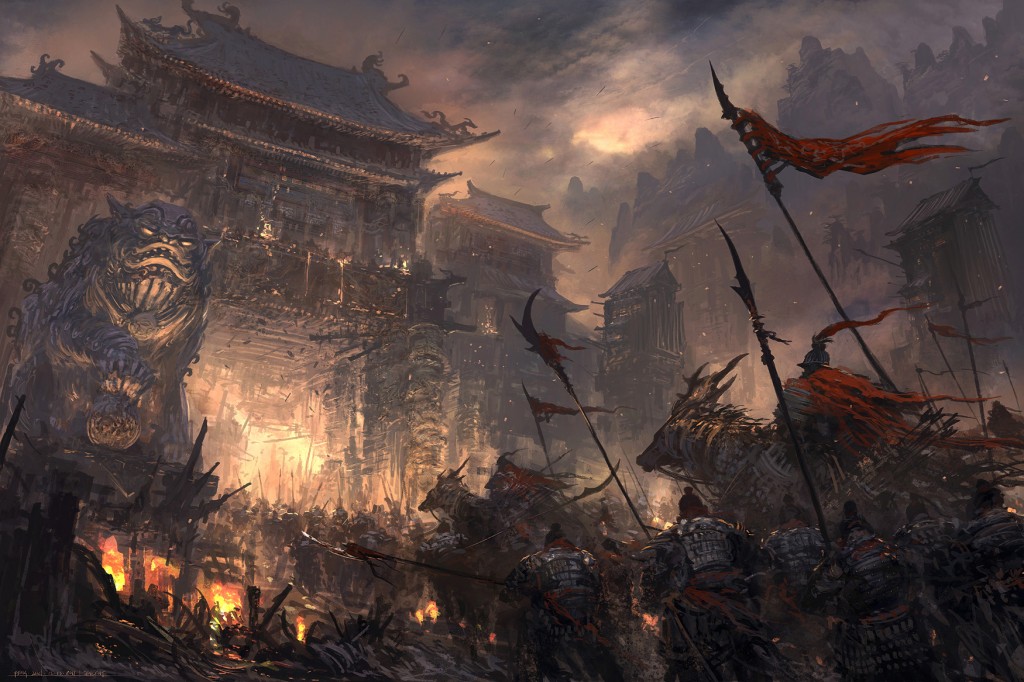
The rebel armies of the Shu Ha rebellion gloriously take the gates of Leoki’s palace in eastern Yunshan
War is the undoing of all civilization. As such it is the Father of incivility, and the mother of anarchy, whose children are named famine, slaughter, and waste. War destroys bloodlines and knowledge. It panics merchant and market. It bankrupts the clan, bereaves the mother, and takes the farmer from his field, their by robbing the food from the mouths of all! War destroys both families, and the sacred traditions which families keep. Indeed, all the woes our people have endured have been in the times of war.
Shall I recount the savage days of our most ancient ancestors?
The tribes of the high mountains took the council of greedy spirits and made constant war on those of the valleys. Only the peace which the T’ien Ming forced upon us allowed us to grow. The T’ien Ming of that time understood that in times of peace, places of learning are full of students, and in times of war, places of learning burn. Under that peace we prospered as in no other time.
Shall I recount the Shu Ha Rebellion?
Even in that just uprising, even under that just cause, that war laid waste our stores of food and cost us the lives of an entire generation. How many ancient texts burned in the fires of looted shrines and libraries? How many craftsmen found death in battle, rather then life at the perfection of their art?
Shall I recount to you the days when the Shinto Dynasty took the place of the T’ein Ming?
In those long many years our lands knew constant war. How many fields burned to satisfy the anger of the warlords? How many in the towns and cities starved as the warlords took the farmers from the lands to fill their armies?
Shall I recount the days after the wretched Shinto were finally cast out of our land?
When we who should have know better took to a savagery in our victory that still stains our pride and haunts the land today. How many mass graves and haunted valleys did we leave in our wake in the name of a foolish justice.
We have embraced the path of peace, and since that time have flourished again.
Now I am no fool of lost ideals. It is known to me that peace is a choice of all sides. It is wise to say that a man may only be peaceful where he is met by the peaceful, and that a man must make war where he is met by the warring. So to seal our peace, to see that we shall know it long and rarely disturbed, let all clans shame the clan which makes war upon another. Let us seal a pact that if one of us shall raise army against another, then all shall see it is the end of the one. Thus we affirm that we are truly civil men, by making our law the law which demands honor and protests the shameful.
Now with war put in its proper place of shame and waste, I must say that so long as our realm is earthly, though heavenly blessed, we shall need warriors. If we are to retain our civility and our traditions, our warriors must be the finest. Thus in casting off the shackles of war, I do not wish to cast away the warriors, or to say we shall live without conflict. Though we can control ourselves by way of honor and law, we cannot control the evil tribes beneath the mountains, nor can we control the endless wastes and the barbarians of those lands.
Indeed, so long as our realm is earthly, we must contend with evil, and to this point, we must be willing to take up the sword and bow. Indeed, we must see these struggles as inevitable. To this end let the newly founded clans honor the warriors among them who threw off the Shinto, for even though we confess to build a thousand years of peace, from time to time, other “Shintos”, the barbarian tyrants of the world, shall come to test our peace. Let these veterans preserve their art, and teach it to those among the young who show a propensity for such work. Let skill at arms take its rightful place at the table of arts, and in the hall of crafts. Let its mastery grow stronger though the ages, as each master further perfects what he was taught by his master, and each style merges and plays upon another to breed yet finer styles, until one day our peace is protected by the finest warriors of the world.
– Meilin Jiao
Beautiful Jade Teacher
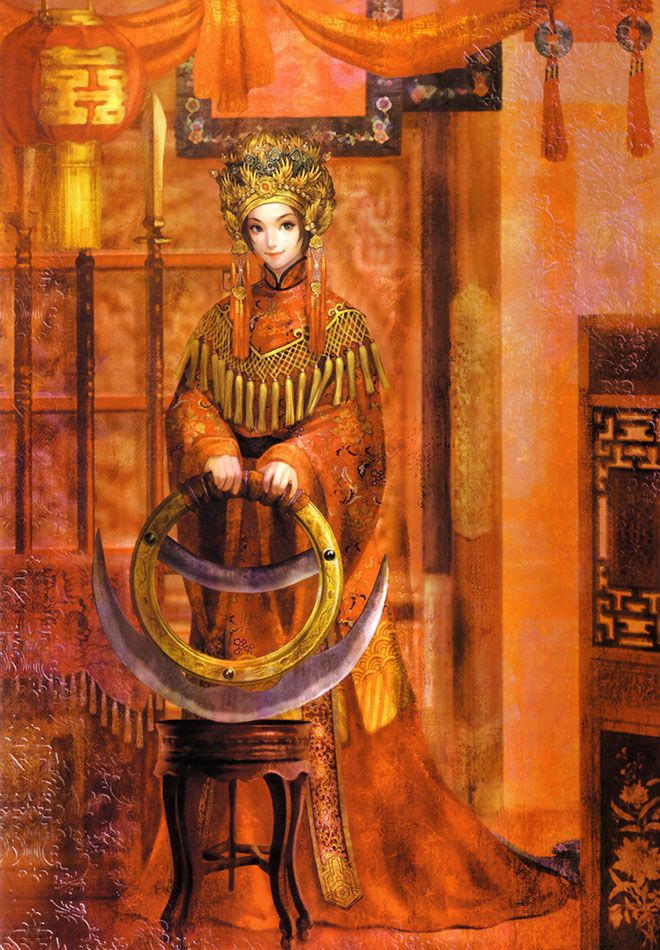
A clan mayor, dressed for a special celebration. Yunshan’s culture is mostly egalitarian. Women can hold high offices and ranks, and bear arms just as men. This is one of many Tein Ming traditions that live on among Yunshan’s high clans.
Yunhan’s High Clans have enjoyed 300 years of relative peace. Every village and town maintains a small defense force, but you’d never see an army from one town marching to attack another. The mist clans, under the laws set down by Council of Final Reckoning, have strict codes for resolving their differences without great bloodshed or loss of life.
The High Clans understand the dangers of the world. They live in an isolated land. They are often forced to defend themselves from some monster of the wilderness or band of foreign rowdies that rides into town looking for trouble.
In addition, their codes call upon a fight as the only way to save face in some situations. There is a very complex tradition of dueling. For many reasons the mist people respect the warrior tradition and have their share of able bodied combatants. They particularly love the more flowing styles of martial arts. In fact, fighting is seen as another art form, akin to dancing or painting, and most learn at least some rudiments while growing up in the clan schools.
In most parts of the world, a place like Yunshan would be ripe for war. There are so many different towns and factions, and no over reaching government to put them in their place. Here however, there is peace. This is because the mist people as a whole have ingrained in their tradition, a sense that war is shameful and wrong. To this end their codes of behavior are designed so that conflicts tend not to escalate, and they pressure foreigners to observe similar codes in their conflicts. Instead of war, the mist peoples use lawful methods such as duels to resolve their martial conflicts. Duels are fairly common in Yunshan, from the cities to the most remote mountain regions. People honor their outcomes as binding law. The most lawful of monks will not break one up, unless he sees a chance that bystanders will be hurt.
In short, calling someone out to one on one combat is seen as a totally legit way to solve things. Through the centuries the people of Yunshan have developed nearly a hundred different styles of duels, from one on one, to group duels, lethal and non lethal. Each style has its own set of traditions and rules, and entire books have been written on the subject. There are even systems of duels designed for priests who wish to challenge an evil demon, or heroes who wish challenge a mighty spirit to honorable combat. The legends are full of tales that describe such confrontations between mortal heroes and supernatural foes!
Sometimes two clans will enter into a power struggle known as a clan war. A clan war is when two clans agree to face off at an agreed upon middle ground, for an agreed number of days, with very strict rules of engagement. Priests often play referee to such conflicts, as the spirits must be properly abated and consulted to deliver the proper winner. A clan war could be between the five best warriors from each town, or have several hundred people per side. In either case, the care with which these are conducted, and the small size make them anything but a war.
7. The Way of the Jun Zi
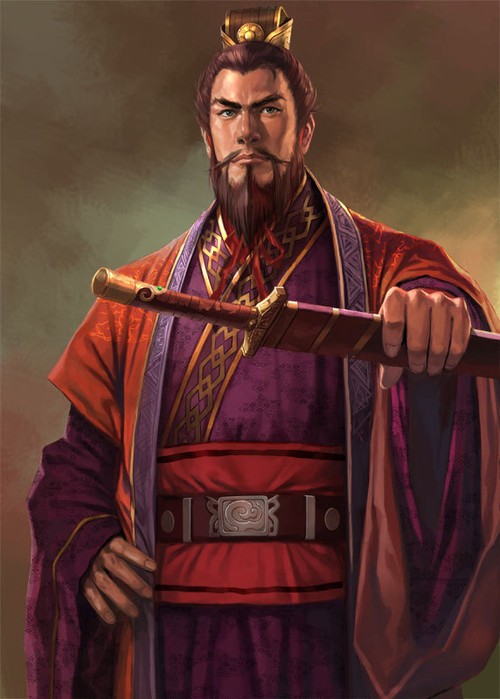
A gentleman does not hesitate to surrender his weapon when asked by his betters…for he seeks to be benevolent with no worry.
Jun Zi was one of the 6 guided guides, and is most famous for clearly defining the way all clansman should aspire to be. Over time his name became a synonym for this way of being, so the word Jun Zi refers to both “wise man”, and to a concept which roughly translates as gentleman or person of honor. Jun Zi produced far too many writings on the subject to relate here, and there are also countless proverbs about proper social behavior which are attributed to Jun Zi. Here are just a few.
Jun Zi said:
A gentleman needs to have three basic characters, which I have not lived up to.
-Be benevolent with no worry.
-Be wise with no confusion.
-Be courageous with no fear.
This is to say if one has a heart with virtue and lenience, he will have peace in his heart and not worry. If one has wisdom and knowledge, he will be decisive. If one has courage, fear will neither confuse nor forestall him. Keep in mind that the three things are an integrated part for a gentleman.’
Jun Zi said:
A gentleman is unlike an implement. A gentleman should be versatile, well rounded, and improve oneself with time.
Jun Zi said:
A gentleman should be harmonious, but should not follow blindly
Jun Zi said:
For a gentleman, action takes precedence over words. A gentleman should speak carefully, but act quickly. A gentleman is ashamed if his words outshine his actions.‘
Jun Zi said:
A gentleman encompasses all and is not partial.
Jun Zi said:
A gentleman is at peace and ease, but not arrogant.
Jun Zi said:
A gentleman helps others to fulfill good, not vice.
Jun Zi said:
With righteousness as the essence, a gentleman should act according to the rites, express himself with modesty, and achieve it with faithfulness.
Jun Zi said:
A gentleman should be dignified, but not disruptive; should be social, but not form a clique.
8.The Path of Right Action
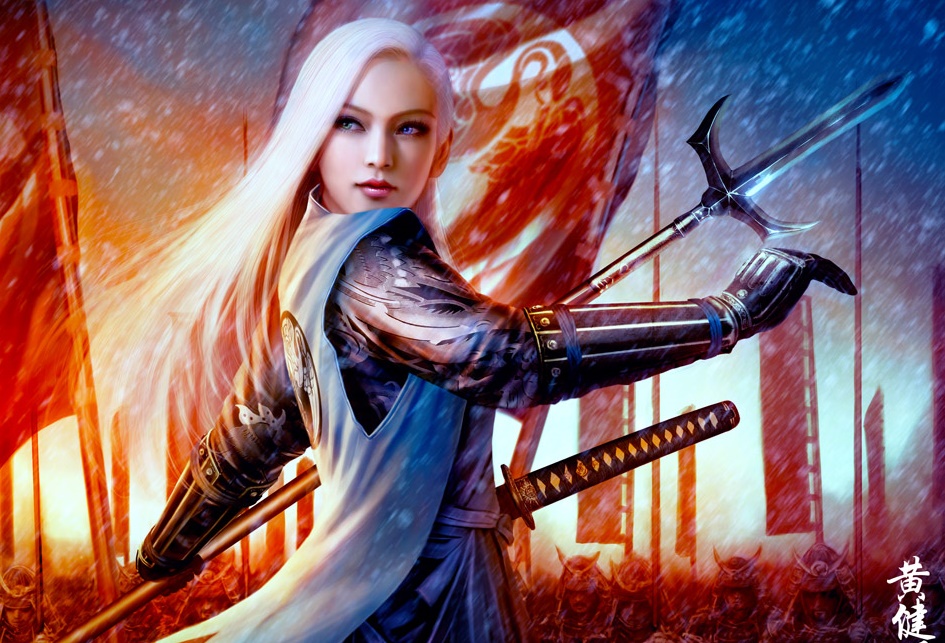
Yunshan’s clan warriors often become enamored with the idea of “Right Action.” To them, it is a warriors code that helps to keep a hero disciplined and honorable.
The Path of Right Action is philosophical belief system that has taken hold in the more bold inhabitants of Yunshan. Some say it originated out of the distant past of the mist people, an old forgotten way of life that barely survived the passage of time to be passed on to the present generation. It is also credited as the teachings of several different monks or holy men from far off places. No one really knows where it came from. It has no formal organization, and no official dogma, though its sayings and writings are many, even if they do sometimes contradict each other. Its adherents are of many different backgrounds.
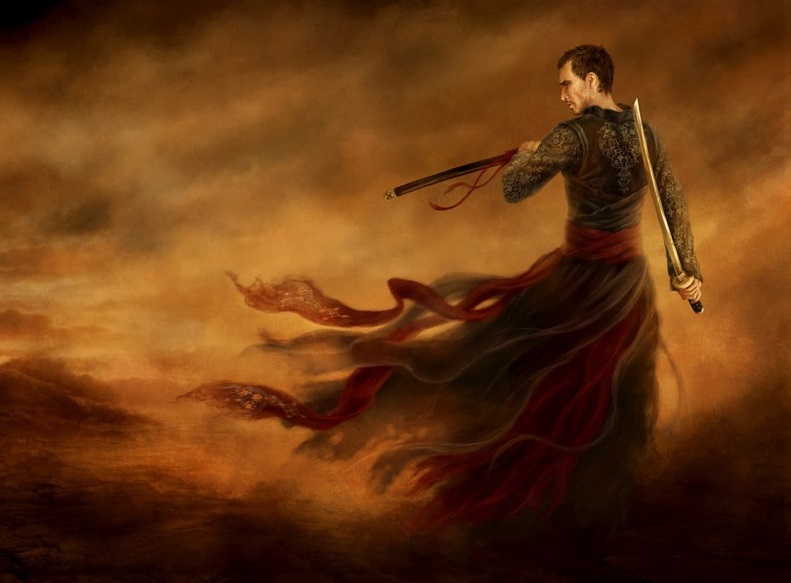
The bandit hunters of the great temples and shrines often follow the the Path of Right action as logical extension to the Shang Ti religion. Demon hunters often see themselves embroiled in a spiritual war that elevates them above the suffering of the common man, but the craft of bandit hunters is to protect the weak from wicked and lawless men. To hunt murderers and thieves…for them, this is the Path of Right Action incarnate.
The Path of Right Action views life as a struggle to be faced. Common men must endure the struggle, and there is honor in that, but exceptional people are called upon to rise against, and then above the struggle, to become masters of their own fate. The Path of Right Action is similar to Bushido, or the way of the warrior, but its message about life’s struggle is more generalized and all encompassing, appealing to heroes of all kinds, not just warriors. It’s tenets are steeped in mysticism and vagueness, and how they are lived out varies broadly based on the interpretation of the follower in question. The Philosophy itself leaves room for much individualism, stressing that each one who walks the path must find their right action and take it. It is important to know the Path of Right Action is not an exclusive belief system. It does not usurp religion, local traditions, clan customs, taboos, the Way of Jun Zi, or anything else the subject might also believe in. It exists alongside these things, as a practical guide on how to apply them.
Most of the mist people follow customs and religious beliefs that teach them the importance of honor, duty, and accepting fate. The Path of Right Action speaks of duty and honor as well, but teaches that people can and should shape their own fate. It also teaches that those who have special skills or great power have a responsibility to take “Right Action” in life for the better of those who do not have such talent or power. Mist People, and sometimes outsiders are usually exposed to the ideas of this belief system by some mentor or wise man they are receiving training from. As a result, many come to believe their training has made them extraordinary, and this calls them to action in life. Usually those who receive training at one of the monastic orders, fighting schools, and sometimes even wujen or priests are exposed to the idea of “Right Action”. It means something a little different to each disciple, but it leads all its followers into bold action. Mist People are generally not interested in adventure. They see it as dangerous, as stirring up trouble and a waste of life, but those who take up the Path of Right Action are often an exception to this rule.
Good hearted people on the Path of Right Action see themselves as the recipient of sacred powers, gifts that should not be abused. They believe their purpose as keepers of this power is to help the weak and unwise. Those who are not ready for enlightenment can at least be helped in some way, so good disciples live lives of charity and helping others. They hate evil. Though they are told by their culture and the priests of the temples that evil is necessary, they often find themselves fighting against it because the goodness in their hearts and the Path of Right Action calls them forth to fight that battle. Good disciples see themselves as wandering helpers or heroes, as upstanding and selfless people who are willing to sacrifice for the greater good. They are typically just that.
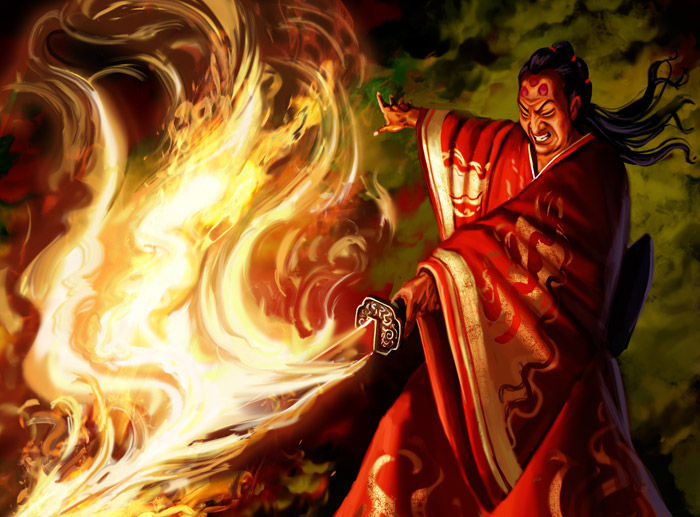
Many wujen see themselves as arcane warriors, protectors of a magical tradition the foolish cattle of Yunshan’s clans have cast aside. They have their own idea of “Right Action”, and the most devout among them can be quite honorable, even if evil.
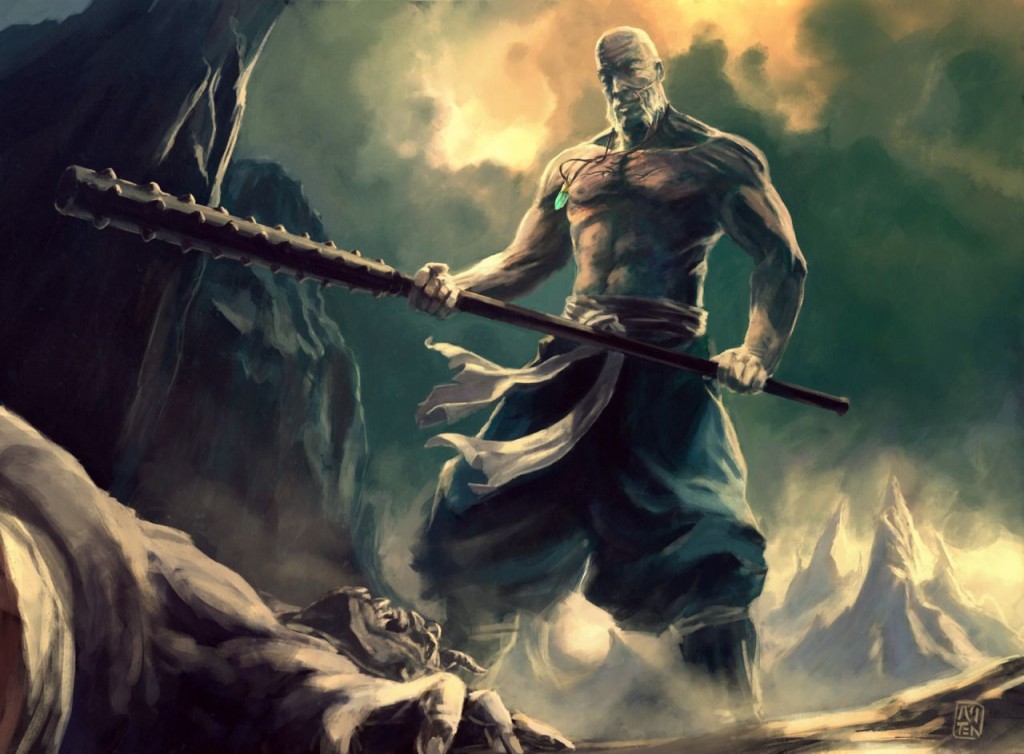
Wandering monks who have mastered martial arts see their talents as something that shouldn’t be locked away in some monastery. The world is full of bullies and thugs, all waiting to be taught a lesson. For some, this is the essence of “Right Action”
Evil people who follow the Path of Right Action see themselves as the worthy recipients of mighty powers, powers that make them faultless and above all others. They believe their purpose as keepers of this power is to teach the weak and unwise painful lessons. The weak and unwise often end up being whoever can be bullied or fooled. Evil disciples like attention and praise, seeking it out with every breath, all the while pretending to be modest. Like good disciples, they see themselves as heroes of the greater good, willing to make sacrifices, but they are not. They are ego maniacs who believe it’s up to them to decide what’s best for the greater good, and they make sure the “sacrifices” that need to be made for “the greater good” end up being paid for by somebody else.
Neutral disciples of the Path of Right Action pursue selfless mastery. They see evil disciples as too lustful and worldly. Their obsession with attention and power blinds them and taints everything they accomplish. Good disciples are too obsessed with the worldly battle between good and evil, and are always distracted by some pointless crusade. Neutral disciples are people concerned with self mastery, and the observance of all the proper laws and taboos of their culture. They take action where they see just laws broken, order disturbed, or cultural standards being disrespected. Since both good and evil people are capable of disturbing order, violating the laws, or bucking tradition, those on the neutral path of right action find themselves at odds with heroes as often as villains. They view ‘Right Action” as that which keeps tradition in place, and power evenly distributed. Only they have mastered the true sense of balance, the total acceptance of all forces as necessary and right.

